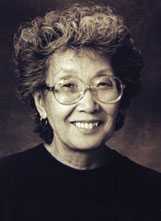Yuri Kochiyama
| Yuri Kochiyama | |
|---|---|
 | |
| Born |
May 19, 1921 San Pedro, California |
| Occupation | Activist |
Yuri Kochiyama (born May 19, 1921) is a Japanese American human rights activist.
Early life
Born Mary Nakahara, Yuri was born and raised in San Pedro, California. Mostly sheltered during her childhood, she grew up in a predominantly white neighborhood with a lifestyle that included sports and Sunday school.
Her life changed on Dec. 7, 1941, when the Japanese Empire bombed Pearl Harbor. Soon after the bombings, the Federal Bureau of Investigation arrested her father, whom they considered a "suspect" who could threaten national security. While her father was in federal prison he was denied medical care and by the time he was released in January, he became too sick to speak. Her father died a few days after his release.
Right after the death of her father, the U.S. government ordered Yuri, her mother and brother to leave their home in San Pedro. They were moved into a horse stable in Southern California for several months and then moved again to Jerome, Arkansas, a Japanese internment camp where they lived for the next three years. While interned, she met her future husband, Bill Kochiyama, a Nisei Soldier fighting for the United States. The couple got married right after the war.
Activist work
In 1960, Kochiyama and her husband Bill moved to Harlem in New York City and joined the Harlem Parents Committee. She became acquainted with Malcolm X and was a member of his Organization of Afro-American Unity, following his departure from the Nation of Islam. She was present at his assassination on February 21, 1965, at the Audubon Ballroom in Harlem, and held him in her arms as he lay dying.
In 1977, Kochiyama joined the group of Puerto Ricans that took over the Statue of Liberty to draw attention to the struggle for Puerto Rican independence. Kochiyama and other activists demanded the release of five Puerto Rican nationalists who were jailed in the United States for more than 20 years. According to Kochiyama, despite a strong movement enabling them to occupy the statue for nine hours, they intended to "give up peacefully when the police came." The five Puerto Ricans were eventually released.
Kochiyama also became a mentor during the Asian American movement that grew during and after the Vietnam War protests. Many young activists came to her for help for several of the Asian American protests. Due to her experience and her ability to interrelate African American and Asian American activist issues, Yuri and her husband could secure reparations and government apologies for injustices toward Asian Americans such as the Japanese American internment. President Ronald Reagan signed the Civil Liberties Act in 1988 which, among other things, awarded $20,000 to each Japanese American internment survivor. The process of issuing reparation checks is ongoing.
Over the years, Kochiyama has dedicated herself to various causes, such as the rights of political prisoners, working on behalf of Mumia Abu-Jamal, nuclear disarmament, and reparations for Japanese American internment.
In 2005, Kochiyama was nominated for the Nobel Peace Prize through the “1,000 Women for the Nobel Peace Prize 2005” project.
Media
- Kochiyama appeared as herself in the TV movie Death of a Prophet — The Last Days of Malcolm X in 1981.
- Kochiyama appeared in the 12 award winning documentary, "All Power to the People!" (1996), by Chinese-Jamaican-American filmmaker Lee Lew-Lee for ZDF-Arte, broadcast in 21 nations and the U.S. between 1996-2001
- Kochiyama was the subject of the documentary film, Yuri Kochiyama: Passion for Justice (1999), from Japanese American filmmaker Rea Tajiri and African American filmmaker Pat Saunders.
- Kochiyama and her husband, Bill Kochiyama, were featured in the documentary, My America...or Honk if You Love Buddha by the Academy Award-nominated filmmaker Renee Tajima-Peña.
- Kochiyama is the subject of a documentary film called "Mountains That Take Wing" Mountains That Take Wing (2009) by C.A. Griffith & L.T. Quan.
- Kochiyama's speeches were published in Discover Your Mission: Selected Speeches & Writings of Yuri Kochiyama (1998), by Russell Muranaka.
- Kochiyama is the subject of a play, Yuri and Malcolm X, by Japanese American playwright, Tim Toyama.
- Kochiyama is the subject of the play Bits of Paradise by Marlan Warren (showcased at The Marsh Theater, San Francisco, 2008), as well as a documentary currently in production, Bits of Paradise: Missives of Hope which focuses on the letter-writing campaign led by Kochiyama during her internment (Producer: Marlan Warren).
- Kochiyama is mentioned in the Blue Scholars' album Bayani on the title track and has a track titled in her honor in their 2011 album Cinemetropolis
External links
- National Women's History Project about Kochiyama
- The Last Revolutionary, by Melissa Hung from the East Bay Express
- Civil Rights Activist Yuri Kochiyama Remembers Her Life, the Day of Malcolm X’s Assassination to Her Internment in a WWII Japanese-American Detention Camp from Democracy Now!
- Yuri Kochiyama in the Freedom Fighters trailer on YouTube
- Bits of Paradise play about Yuri Kochiyama on YouTube
- Documentary in production about Yuri Kochiayama's Crusaders
|